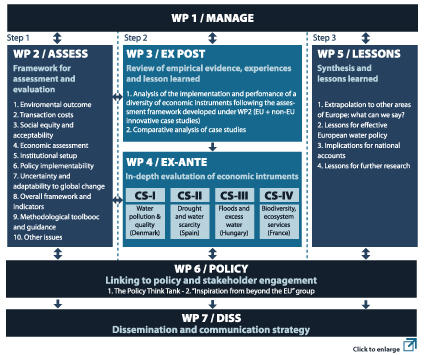About the Project
Plan of the work
The EPI-Water research project are developed in seven Workpackages (WPs) and the research activities are structured into three consecutive steps. The structure is shown in the figure below.
Step 1: developing the comprehensive framework to assess EPI
This step is developed under WP2 that sets to develop a comprehensive assessment framework, based on and advancing the best practices for economic and integrated analysis in water policy and management. This framework will be applied for, and revised in the context of the following WPs. Particular attention will be given to National Accounts (a specific sub-task being dedicated to this topic).
Step 2: Testing and adapting the framework for ex ante and ex post assessment
This step builds on the assessment framework developed under WP2 to assess the performance of EPIs. It is structured into two separate WPs:
- WP3 focuses on the ex-post assessment of existing EPIs in Europe (the majority of case studies) but also outside Europe (for selected innovative EPI not well applied in Europe). Overall, around twenty-five ex-post performance reviews will be performed from case studies in Europe and beyond (particularly from Chile, Canada, USA, Australia, Israel, Morocco)
- WP4 that is central to the EPI-Water proposes to undertake in-depth ex-ante assessments for 4 case study areas representing priority policy thematic areas: water scarcity/drought, flood and excess water management, water quality control, and biodiversity/ecology. Different integrated/hydrological/economic models and tools (including national accounts for a specific case study) will be used for supporting the assessment of different EPI scenario(s).
Overall, the different case studies and river basins investigated in WP3 and WP4 cover a range of distinct geophysical, environmental, socio-economic, cultural and institutional conditions, making it easier to extrapolate the knowledge and insights gained to other countries/regions in Europe. Furthermore several case studies selected have been addressed in a number of (national and EC) research projects, the knowledge and tools gained/produced in these projects being then exploited for the EPI-Water research activities ensuring effective use of available financial resources.
Step 3: Telling lessons learned
WP5 represents this step, building on the results of the two previous steps for the synthesis and extrapolation of key knowledge and insights gained, both in terms of policy making and in terms of scientific knowledge/future research issues.
Transversal WPs
These four research-focused WPs are supported by three transversal WPs:
- WP1 is dedicated to the overall management of the EPI-Water research project.
- WP6 manages the two-direction links between EPI-Water research and the wider scientific and policy communities. It includes: the launching and facilitation of the Policy Think Tank; the activities of the “Inspiration beyond the EU” group making operational the link between EU and non-EU experiences and scientific communities
- WP7 develops specific well-targeted communication and dissemination activities of EPI-Water innovative research approaches and results.

